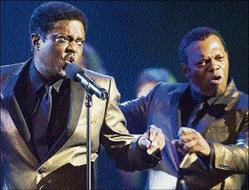
Bernie Mac (left) and Samuel L. Jackson in a scene from 'Soul Men'. - contributed
Soul Men
Directed by Malcolm Lee.
Starring Samuel L. Jackson, Bernie Mac
103 minutes. Comedy.
Soul Men is the story of washed-up, estranged bandmates, Floyd Henderson (Bernie Mac) and Louis Hinds (Samuel L. Jackson), as they journey across the United States, into the past, and through each other, to play a comeback performance at the Apollo Theatre in Harlem, New York.
Directed by Malcolm Lee, cousin to the African-American auteur Spike Lee (Do the Right Thing, Bamboozled), the film shows us the unforgiving side of fame, when the music, money and media attention have disappeared, leaving Henderson and Hinds aimless and penniless.
Episodic misadventures
Henderson talks Hinds into their first joint appearance in 30 years, setting the stage for one episodic misadventure after another, including one-night stands, confusion over paternity and a night in prison.
Long-time writing partners, Robert Ramsey and Matthew Stone, are adept at the sniping banter that passes for male bonding between the two musicians. But where the script should have moved beyond cheap shots and cheaper motel rooms, the scribes substitute profanity for profundity.
Director Lee's pedigree stands in contrast to his résumé. Soul Men joins previous works, Undercover Brother (2002) and Roll Bounce (2005) in the uncomfortable space between parody and stereotype. Lee is unsure of his audience, and the result panders to black and white alike. His contemporary, Tyler Perry, hews to safer themes of family, community and religious unity.
Jackson is merely adequate as the forgotten backup singer Hinds; his characterisation is a collection of scowls and squints. Sharon Leal is better as the vocal ingénue the duo discover on the road.
Bernie Mac's bumbling, blustering, bug-eyed buffoon, while mildly entertaining, calls forth the forgotten films of the 1930s and '40s. Mantan Moreland, Willie Best, Clarence Muse and many talented others built careers playing the only roles available to them - bumbling, blustering, bug-eyed buffoons, or, as they were known then, coons.
The coon archetype was born even earlier, in 19th-century minstrel shows, where white actors in blackface lampooned African-American life for their own amusement. It has endured, kept alive by actors of colour, torn between pride and pay cheques, between a principle and a principal, a never-ending line of sycophantic, shining, smiling faces from Bill Robinson to Bill Cosby, from Eddie Anderson to Eddie Murphy.
Unfortunate coda
It is unfortunate that Mac should have Soul Men as his coda; his film and television work showed a man rapidly mastering his craft. His social commentary was sharp, but accessible; his humour broad, but biting. His eponymous sitcom, The Bernie Mac Show, skewered African-American family life for the generation born during The Cosby Show.
Soul Men reaches for a bit of history itself - Hinds and Henderson's comeback performance is a tribute to the deceased third member of their fictional group The Real Deal, Marcus Hooks, played by real-life soul superstar, John Legend. Soul legend Isaac Hayes also makes an appearance. It seems that Lee and company understand that while fame and fortune fade, true talent stands the test of time.
Soul Men joins previous works, Undercover Brother (2002) and Roll Bounce (2005) in the uncomfortable space between parody and stereotype.